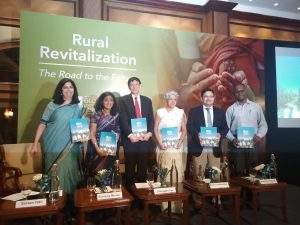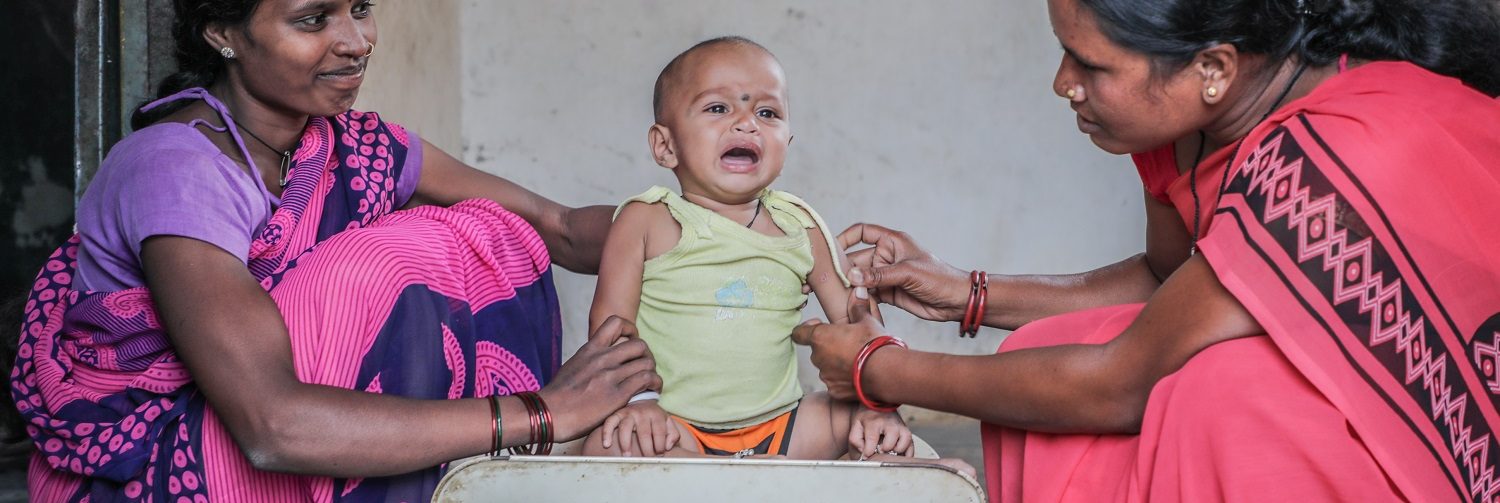India’s report card on rural development presents a mixed picture: While a number of rural infrastructure and employment programs have moved forward, focusing overall on inclusive development, progress on ground has been slow and uneven throughout the country. In India’s largest city and financial nerve center Mumbai, experts discussed the best path forward at the launch of IFPRI’s 2019 Global Food Policy Report (GFPR) May 19 at an event titled Rural Revitalization: The Road to the Future.
The event, jointly organized with Tata Trusts, the philanthropic arm of one of India’s biggest and oldest conglomerate, Tata Sons, and Dasra, focused on the challenges to ensuring food and nutrition security in the rural areas of Maharashtra and rest of the country; and how philanthropic foundations, corporate social responsibility and the industry can support rural transformation.
“Over the last few years, we have been looking at diversifying livelihoods—bringing different forms of livelihoods to people, but also very importantly, [focusing on] health, nutrition, education, water, sanitation, climate change and environment to make and create prosperous rural communities,” said Tata Trusts Head of Policy and Advocacy Shireen Vakil. The foundation has been focusing most of its work on creating rural livelihoods in the country for the last 100 years.
“Revitalizing rural areas can stimulate economic growth and begin to address the crises in developing countries, and also tackle challenges holding back achievement of the SDGs and climate goals by 2030,” said IFPRI Director General Shenggen Fan. “Rural revitalization is timely, achievable, and, most important, critical to ending hunger and malnutrition in just over a decade.”
The 2019 GFPR outlines a strategy to transform rural areas into hubs of economic innovation in just under a decade, with a focus on five building blocks: Creating farm and non-farm rural employment opportunities; achieving gender equality; addressing environmental challenges; improving access to energy; and promoting more effective governance.
Health and nutrition are key components of the rural revitalization agenda, IFPRI Senior Research Fellow Purnima Menon emphasized. “Even though stunting among children and underweight among adult women and men have declined over time, both in rural areas and in urban areas, they remain higher in rural areas,” said Menon. Along with undernutrition, India also faces the challenge of overnutrition in both rural and urban areas. “Overweight among adults has increased in all areas; and almost 1 in 6 adults is overweight in rural areas, and 1 in 3 in urban areas,” Menon said.
To revitalize rural areas, results-oriented partnerships—that bring inclusivity, transparency, reflexibility and efficiency—between various stakeholders at the ground level are essential. The MS Swaminathan Foundation’s Madhura Swaminathan cited the example of Kerala-based community network Kudumbashree, which has emerged as much more than a women’s self-help group over time: It’s now a state-level partnership with a democratic and transparent functioning style, having a powerful impact on rural lives—a perfect example of building partnerships at community, village and local government levels to expand capacity and mobilize resources in rural areas. “We have to look a little more at partnerships other than public-private and private-civil society and make sure we have some democratic and transparent function,” said Swaminathan.
Panelists from Maharashtra Village Social Transformation (VSTF), Centre for MicroFinance and Dasra shared examples of innovative ways to connect rural areas, governments, and industry to empower, revitalize and strengthen rural areas. VSTF’s Ramnath Subramanian shared how they bridged the gap between government and corporate sector in villages by appointing a social worker in each of the villages under the program to oversee rural transformation efforts. Dasra’s Priti Dasgupta emphasized the importance of making rural areas vibrant and safe places for girls and women to study, work and live.
Panelists also underlined the need to build evidence to help shape rural revitalization policies and programs, agreeing that current investments in research and evidence-building are in many cases still in the early stages and require sustained support going forward.
The launch of recent government efforts such as the Healthy India Initiative to provide health centers and health coverage to the most vulnerable, and the National Nutrition Mission (or POSHAN Abhiyaan) targeting nutritional status of infants, children, and mothers, have set the ball rolling to improve the health and nutritional status of the most vulnerable groups. “We have challenges, but we also have reasons to be hopeful,” said IFPRI South Asia Director Shahidur Rashid. “We are coming up with innovative ideas and institutions [in the public private partnership sector] to tackle the problem and this is doable.”
This blog was first posted on IFPRI blog.



